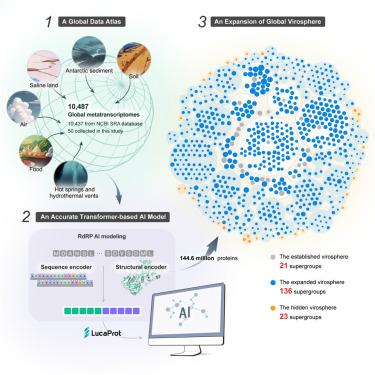利用人工智能记录隐藏的 RNA 病毒球
IF 45.5
1区 生物学
Q1 BIOCHEMISTRY & MOLECULAR BIOLOGY
引用次数: 0
摘要
目前的元基因组工具可能无法识别高度分化的RNA病毒。我们开发了一种称为 LucaProt 的深度学习算法,在从全球不同生态系统中生成的 10,487 个元转录组中发现高度分化的 RNA 依赖性 RNA 聚合酶(RdRP)序列。LucaProt 整合了序列和预测结构信息,能够准确检测 RdRP 序列。利用这种方法,我们发现了 161,979 个潜在的 RNA 病毒物种和 180 个 RNA 病毒超群,其中包括许多以前未曾深入研究过的群组,以及具有特殊长度(多达 47,250 个核苷酸)和基因组复杂性的 RNA 病毒基因组。这些新型 RNA 病毒中的一部分已通过 RT-PCR 和 RNA/DNA 测序得到证实。新发现的 RNA 病毒存在于不同的环境中,包括空气、温泉和热液喷口,不同生态系统中病毒的多样性和丰度差异很大。这项研究推动了病毒的发现,凸显了病毒球的规模,并为更好地记录全球 RNA 病毒群提供了计算工具。本文章由计算机程序翻译,如有差异,请以英文原文为准。

Using artificial intelligence to document the hidden RNA virosphere
Current metagenomic tools can fail to identify highly divergent RNA viruses. We developed a deep learning algorithm, termed LucaProt, to discover highly divergent RNA-dependent RNA polymerase (RdRP) sequences in 10,487 metatranscriptomes generated from diverse global ecosystems. LucaProt integrates both sequence and predicted structural information, enabling the accurate detection of RdRP sequences. Using this approach, we identified 161,979 potential RNA virus species and 180 RNA virus supergroups, including many previously poorly studied groups, as well as RNA virus genomes of exceptional length (up to 47,250 nucleotides) and genomic complexity. A subset of these novel RNA viruses was confirmed by RT-PCR and RNA/DNA sequencing. Newly discovered RNA viruses were present in diverse environments, including air, hot springs, and hydrothermal vents, with virus diversity and abundance varying substantially among ecosystems. This study advances virus discovery, highlights the scale of the virosphere, and provides computational tools to better document the global RNA virome.
求助全文
通过发布文献求助,成功后即可免费获取论文全文。
去求助
来源期刊

Cell
生物-生化与分子生物学
CiteScore
110.00
自引率
0.80%
发文量
396
审稿时长
2 months
期刊介绍:
Cells is an international, peer-reviewed, open access journal that focuses on cell biology, molecular biology, and biophysics. It is affiliated with several societies, including the Spanish Society for Biochemistry and Molecular Biology (SEBBM), Nordic Autophagy Society (NAS), Spanish Society of Hematology and Hemotherapy (SEHH), and Society for Regenerative Medicine (Russian Federation) (RPO).
The journal publishes research findings of significant importance in various areas of experimental biology, such as cell biology, molecular biology, neuroscience, immunology, virology, microbiology, cancer, human genetics, systems biology, signaling, and disease mechanisms and therapeutics. The primary criterion for considering papers is whether the results contribute to significant conceptual advances or raise thought-provoking questions and hypotheses related to interesting and important biological inquiries.
In addition to primary research articles presented in four formats, Cells also features review and opinion articles in its "leading edge" section, discussing recent research advancements and topics of interest to its wide readership.
 求助内容:
求助内容: 应助结果提醒方式:
应助结果提醒方式:


